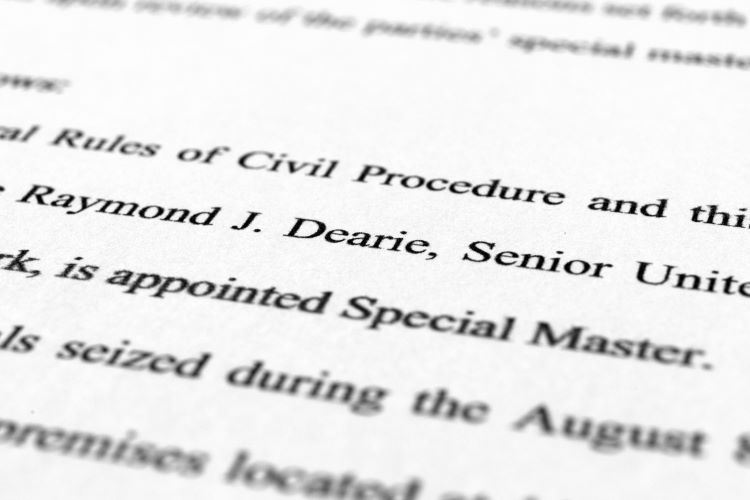Meet Raymond Dearie, the judge picked to oversee Mar-a-Lago documents review

A page from the order by U.S. District Judge Aileen Cannon naming Senior U.S. District Judge Raymond J. Dearie as special master to serve as an independent arbiter and to review records seized during the August FBI search of former President Donald Trump’s Mar-a-Lago estate. Photo by Jon Elswick/The Associated Press.
Senior U.S. District Judge Raymond J. Dearie will serve as the special master overseeing the review of records seized from former President Donald Trump’s Mar-a-Lago residence, a federal judge ruled Thursday.
U.S. District Judge Aileen M. Cannon of the Southern District of Florida appointed Dearie and rejected a U.S. Department of Justice request that she allow the DOJ to use seized classified documents in its criminal investigation during the review.
Law.com (here and here), the New York Times, the Associated Press, Reuters, the Washington Post, Politico and NPR are among the publications with coverage.
Cannon said in her Sept. 15 order that she will allow the DOJ, however, to continue to investigate “the movement and storage of seized materials, including documents marked as classified, without discussion of their contents.” And she affirmed her earlier decision allowing a classification review and intelligence assessment by the Office of the Director of National Intelligence.
Cannon said Dearie should prioritize review of the documents marked as classified, and the court will “consider prompt adjustments to the court’s orders as necessary.” She also set Nov. 30 as the target date for Dearie to complete his work.
Cannon ruled that Trump will have to pay the costs of the special master, according to the New York Times.
Cannon chose Dearie after he was one of two judges recommended by Trump’s lawyers, and the DOJ said it would also support him.
 An aerial view of former President Donald Trump’s Mar-a-Lago club in Palm Beach, Florida, on Aug. 31. Photo by Steve Helber/The Associated Press.
An aerial view of former President Donald Trump’s Mar-a-Lago club in Palm Beach, Florida, on Aug. 31. Photo by Steve Helber/The Associated Press.
Dearie, 78, was a U.S. attorney for the Eastern District of New York for four years before he was nominated by former President Ronald Reagan in 1986 to serve as a judge in the same district. He took senior status in 2011 and has said he intends to go on inactive status at the end of the year, according to Law.com.
Dearie served a seven-year term beginning in 2012 on the Foreign Intelligence Surveillance Court, which considers wiretap applications in national security cases. He was one of the judges who approved surveillance of former Trump campaign adviser Carter Page.
Dearie is a 1969 graduate of St. John’s University School of Law. He worked after graduation at Shearman & Sterling. He also worked at a second law firm, Surrey & Morse, that later merged with Jones Day, according to Law.com.
Politico summarized comments about Dearie this way: “Lawyers and litigants who have appeared before Dearie describe him as [an] independent, thorough and even-handed jurist who is fit to wrangle the dueling sides. As much as any judge put in this difficult position, they say he’s up to the task.”
In one notable case, Dearie cut the prison sentences of three convicted Canadian terrorists from 25 to 15 years, stating that he had been “haunted” by the original sentences.
But Dearie sentenced al-Qaida member Abid Naseer to 40 years in prison for plotting attacks on the New York City subway system and other locations, NPR reported. When Nasser protested that he wasn’t a career criminal, Dearie had a rejoinder.
“I know you’re not,” Dearie said. “You’re a terrorist.”
One lawyer praising Dearie is Patrick Cotter, a former federal prosecutor in Brooklyn, New York City.
“There wasn’t much personality, and I mean that as a compliment. Ray wasn’t chummy, and he wasn’t a good ol’ Brooklyn boy or highfalutin’ guy trying to impress you,” Cotter told the Washington Post. “He was a very matter-of-fact, down-to-earth judge with a minimum of pomposity. He will do a credible job and will do it quickly.”
Federal prosecutor Andrew Weissmann, who also worked with special counsel Robert Mueller on the Russia election interfernce probe, told NPR that Dearie was compassionate and fair. He recalled an instance when he was a new prosecutor, and Dearie was late for a court appearance.
“A few days later, I got in the mail a handwritten apology from him,” Weissmann told NPR.
The defense lawyer also got an apology.
“It was just remarkable because judges have a lot of power—they don’t need to do that,” Weissmann said.
Daniel R. Alonso, a partner at Buckley, told NPR that Dearie was an “old-school gentleman and unfailingly polite.”
Alonso said Dearie “would never tolerate the kinds of arguments that Trump’s lawyers tend to put forward.”
See also:
ABAJournal.com: “Trump requests special master for review of documents seized by FBI”
ABAJournal.com: “Could Trump be banned from office if he’s convicted of taking government documents?”
ABAJournal.com: “DOJ files motion to unseal warrant, property receipt relating to search of Trump’s home”
ABAJournal.com: “Judge who signed Trump search warrant is targeted; critics seek ‘judgment of God’”
ABAJournal.com: “Trump search-warrant affidavit, released on judge’s orders, cites sensitive documents, possible obstruction”
Write a letter to the editor, share a story tip or update, or report an error.



